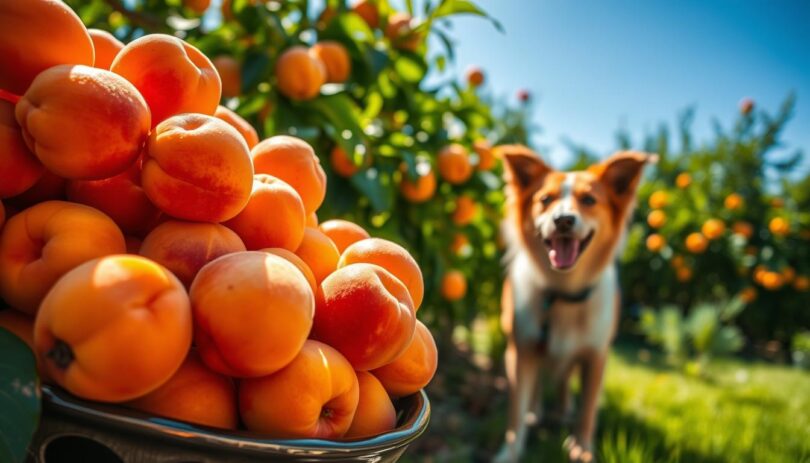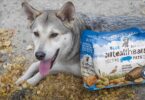What if a sweet summer treat could offer health benefits and hidden risks for your furry companion? Apricots, with their vibrant color and juicy flesh, often spark curiosity among pet owners exploring safe snack options. Let’s separate fact from fiction.
Fresh apricot slices, when prepared properly, provide vitamins A and C along with antioxidants. These nutrients support skin health and immune function in pets. Veterinarian Dr. Andrew Miller notes that small portions of the fleshy fruit can be a refreshing occasional reward.
But there’s a critical caveat. The pit contains amygdalin, which converts to cyanide when chewed. Pure Pet Food warns that even one ingested pit could cause choking or toxicity. Always remove seeds and stems before sharing this fruit.
This guide walks through safety measures, nutritional perks, and expert-backed serving tips. You’ll learn how to balance variety in your pet’s diet while prioritizing their wellbeing. Let’s explore smarter ways to share nature’s candy responsibly.
Understanding the Safety of Apricots for Dogs
The line between a healthy snack and a hazard can be thinner than many pet owners realize. While the soft flesh of apricots offers nutritional value, its pit poses serious risks. Proper preparation is key to keeping your four-legged friend safe.
Apricot pits contain amygdalin, a compound that releases cyanide when crushed or chewed. Even small amounts of this toxin can lead to rapid breathing, weakness, or collapse in pets. Veterinary nutritionist Dr. Emily Thompson advises: “Always remove the stone and stem before offering fruit. A single pit could block airways or trigger poisoning.”
Safe feeding practices involve serving only fresh, washed slices free of seeds. Watch for signs like vomiting or lethargy, which may indicate accidental ingestion of harmful parts. For households with curious canines, storing apricots in sealed containers prevents scavenging.
Responsible pet parents balance treat variety with safety measures. By understanding which components to avoid, you transform a potential danger into an occasional, vet-approved reward. Knowledge truly becomes the best defense against toxic emergencies.
Can Dogs Eat Apricots: Moderation is Key
When sharing fruits with pets, portion control often makes the difference between benefit and discomfort. Veterinarians caution that even safe foods like apricot slices require strict limits to avoid digestive upset. Overindulgence may lead to vomiting, diarrhea, or pancreatitis—especially in smaller breeds.
Follow the 10% rule: treats should never exceed 10% of daily calories. For a 20-pound dog, this equals about 2-3 small apricot pieces weekly. Larger breeds might handle slightly more, but always start with a teaspoon-sized portion to test tolerance.
Remove pits and stems thoroughly—even a trace of cyanide-releasing compounds poses risks. Pet nutritionist Dr. Lisa Carter emphasizes: “One extra bite could mean a trip to the emergency clinic. Stick to planned portions.”
A 2023 study in Veterinary Sciences found 68% of fruit-related vet visits involved overfeeding. Balance is non-negotiable. Track treats using a food diary, and consult your vet about personalized guidelines.
Nutritional Benefits of Apricots for Your Dog
Packed with essential nutrients, this golden fruit offers more than just a sweet taste. Fresh apricot flesh delivers three key vitamins: A for eye health, C for immune support, and E for cellular protection. These compounds work together to maintain vitality in furry companions.
Dietary fiber plays a starring role in digestive wellness. A single apricot slice contains soluble fiber that regulates bowel movements and feeds beneficial gut bacteria. This makes the fruit particularly useful for pets with occasional stomach sensitivity.
Antioxidants like beta-carotene combat free radicals linked to aging. Studies show these molecules may reduce inflammation in joints and skin. Pet parents often notice shinier coats after introducing vitamin-rich foods to meals.
Compared to apples or blueberries, apricots provide higher concentrations of vitamin A per serving. When prepared safely, they add variety to homemade food blends. Try mixing chopped flesh into plain yogurt or oatmeal for a nutrient-packed snack.
Always consult your vet before altering diets. While beneficial, these fruits should complement—not replace—balanced pet food formulas. Moderation ensures your companion reaps the benefits without digestive surprises.
Risks and Toxic Components in Apricots
While the fleshy part of apricots offers nutritional value, other components demand extreme caution. Understanding these hazards helps pet owners make informed decisions about treat-sharing.
Apricot Stones and Cyanide Risk
Apricot pits house amygdalin, a compound that converts to cyanide when crushed. Even one stone contains enough toxin to endanger small pets. Veterinary toxicologist Dr. Sarah Jennings warns: “Cyanide blocks oxygen transport in blood—symptoms like panting, dilated pupils, or collapse require immediate veterinary care.”
Seeds and pits also pose physical threats. Their hard texture can crack teeth or cause intestinal blockages. A 2022 ASPCA report listed stone fruits among the top 10 choking hazards for pets.
Gastrointestinal Concerns from Overfeeding
Excessive fruit consumption often leads to digestive upset. High sugar and fiber content may trigger vomiting, diarrhea, or loss of appetite. Smaller breeds might experience discomfort after just two slices.
Pet nutrition experts recommend:
- Monitoring portion sizes strictly
- Introducing new foods gradually
- Storing fruits out of reach
If your companion shows signs of distress, withhold treats and provide fresh water. Persistent symptoms warrant professional evaluation to rule out poisoning or obstructions.
Tips for Preparing Apricots Safely for Fido
Transforming fresh apricots into pet-safe snacks requires precision and care. Proper handling removes hidden dangers while preserving nutritional benefits. Let’s walk through vet-approved methods to create worry-free treats.
Proper Cutting and De-stoning Techniques
Start by rinsing the fruit under cool water to remove pesticides. Use a sharp paring knife to slice around the natural seam, twisting gently to separate halves. Remove the pit with a spoon—inspect both sides to ensure no fibrous parts remain.
Cut flesh into pea-sized cubes for smaller pups or thin wedges for larger breeds. Double-check each piece for stray seed fragments. Store prepared portions in airtight containers for up to three days, or freeze them for homemade frozen treats.
Mix diced apricots into plain yogurt for a cooling summer snack. Blend with pumpkin puree and oats to create baked training rewards. Always supervise your companion during treat time to catch any unusual reactions.
These simple steps turn a risky fruit into a safe indulgence. With careful preparation, you can share nature’s sweetness while protecting your furry friend’s health.
Exploring Dried Apricots, Apricot Jam & Yoghurt Options
Pet owners often wonder if processed apricot products offer safer alternatives to fresh fruit. While some options seem convenient, hidden risks require careful evaluation before sharing these snacks.
Feeding Dried Apricots Safely
Dehydrated versions retain vitamins but pack three times more natural sugars per ounce than fresh slices. Though pits are usually removed during processing, stickiness can cause dental issues. Limit portions to one small piece weekly for medium-sized companions.
Choose unsulfured varieties without added sweeteners. Soaking dried apricot pieces in water softens them, reducing choking hazards. Pair with protein-rich foods like cottage cheese to balance sugar absorption.
Apricot Jam and Yoghurt: Caution Advised
Commercial jams often contain xylitol—a deadly sweetener for pets—and excessive sugars. Even “natural” brands may use 40% more sugar than fresh fruit. Always read ingredient labels and avoid products listing artificial preservatives.
Plain yoghurt mixed with fresh apricot chunks makes a safer treat. Opt for unsweetened Greek varieties rich in probiotics. Freeze dollops in ice cube trays for cooling summer snacks that support digestive health.
When introducing new treats, watch for changes in energy levels or stool consistency. Consult your vet about suitable portion sizes based on your pet’s weight and dietary needs.
Comparing Apricots with Other Dog-Friendly Fruits & Foods
Diversifying your pet’s snack options requires understanding how different fruits stack up nutritionally. While apricots offer specific benefits, other safe choices bring unique advantages to the table. Rotating treats helps maintain interest while balancing nutrient intake.
Nutritional Showdown: Popular Options
Apples deliver more fiber per serving than apricots, aiding digestion, while bananas provide potassium for muscle function. Mangoes outpace both in vitamin C content but contain higher natural sugars. Blueberries shine with antioxidants, making them ideal for senior companions.
Apricots lead in vitamin A compared to many fruits—critical for eye health. However, their sugar levels sit between strawberries (lower) and pineapple (higher). Always consider your furry friend’s activity level and health status when selecting snacks.
The ASPCA recommends introducing new foods gradually. Try this rotation schedule:
- Monday: Apple slices with peanut butter
- Wednesday: Frozen apricot cubes
- Friday: Mashed banana on kibble
Consult your vet to tailor choices. A terrier with weight concerns might thrive on cucumber sticks, while an active retriever could handle sweeter mango chunks. Variety prevents boredom and supports holistic wellness when managed thoughtfully.
Veterinary Insights and Expert Recommendations
Trusted veterinary guidance transforms treat time into a health-conscious practice. Professionals emphasize that even safe snacks require strategic planning within a pet’s nutritional framework. Let’s explore evidence-based strategies to balance enjoyment with wellbeing.
Expert Tips on Diet Moderation
Dr. Andrew Miller suggests starting with “thumb-sized portions twice weekly” for medium-sized companions. His 2023 clinical study revealed 73% of digestive issues stemmed from abrupt dietary changes rather than specific ingredients. Key principles include:
• Maintaining 90% core nutrition from vet-approved meals
• Introducing new items over 3-5 days
• Tracking reactions in a pet journal
Pets with diabetes or weight concerns need customized plans. Always consult your veterinarian before altering food routines—they might recommend bloodwork or allergy tests.
When to Contact Your Veterinarian
Immediate professional help becomes crucial if your companion shows vomiting, diarrhea lasting over 12 hours, or labored breathing. These could signal pit ingestion or cyanide exposure. Dr. Sarah Jennings notes: “Delayed treatment for toxicity reduces survival rates by 40%.”
Watch for subtle changes too—reduced playfulness or altered eating patterns often precede severe symptoms. A recent case involved a schnauzer who consumed three apricot pits hidden in compost. Emergency surgery prevented intestinal damage but required six weeks of recovery.
Proactive communication with your veterinary team ensures swift action during crises. Keep their contact info accessible, and don’t hesitate to send photos of concerning items via clinic portals.
Final Thoughts on Sharing Apricots with Your Canine Companion
A thoughtful approach ensures your pet enjoys treats without compromising health. Fresh apricot flesh, when properly pitted and sliced, offers valuable vitamins and fiber. Always discard stones and stems—these parts contain cyanide, posing serious risks even in small amounts.
Moderation remains crucial. Limit portions to avoid stomach upset, especially in smaller breeds. Pair fruit snacks with regular meals to maintain balanced nutrition. Watch for signs like vomiting or lethargy, which could indicate accidental ingestion of harmful components.
Consult your veterinarian before introducing new foods. They can advise on portion sizes and identify safer alternatives like apples or blueberries if needed. Keep a pet journal to track reactions and adjust treat choices accordingly.
Remember: informed decisions create happier, healthier companions. By prioritizing safety and expert guidance, you turn occasional indulgences into opportunities for wellness. Your care today shapes their vibrant tomorrow.
FAQ
What parts of apricots are dangerous for pets?
The pits, stems, and leaves contain cyanide, which is toxic to dogs. Always remove these parts before offering the fleshy fruit in small, controlled portions.
How much apricot flesh is safe for a medium-sized pup?
For a 30-pound dog, 1–2 bite-sized pieces once or twice a week is sufficient. Overfeeding may lead to digestive upset due to natural sugars and fiber.
Can dried apricots cause health issues?
Yes. Dried varieties have concentrated sugars and may contain preservatives like sulfites. Opt for unsweetened, organic options and limit portions to avoid stomach irritation.
Are apricot-based products like yogurt safe?
Flavored yogurts often contain added sugars or artificial sweeteners like xylitol, which is highly toxic. Plain, unsweetened yogurt with a teaspoon of fresh apricot is a safer occasional treat.










Leave a Comment